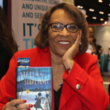One Crazy Summer
(Libby/OverDrive eBook, Kindle)
Available Platforms
Description
In this Newbery Honor novel, New York Times bestselling author Rita Williams-Garcia tells the story of three sisters who travel to Oakland, California, in 1968 to meet the mother who abandoned them. A strong option for summer reading—take this book along on a family road trip or enjoy it at home.
This moving, funny novel won the Scott O'Dell Award for Historical Fiction and the Coretta Scott King Award and was a National Book Award Finalist. Delphine, Vonetta, and Fern's story continues in P.S. Be Eleven and Gone Crazy in Alabama.
Readers who enjoy Christopher Paul Curtis's The Watsons Go to Birmingham and Jacqueline Woodson’s Brown Girl Dreaming will find much to love in One Crazy Summer. Rita Williams-Garcia's books about Delphine, Vonetta, and Fern can also be read alongside nonfiction explorations of American history such as Jason Reynolds's and Ibram X. Kendi's books.
In One Crazy Summer, eleven-year-old Delphine is like a mother to her two younger sisters, Vonetta and Fern. She's had to be, ever since their mother, Cecile, left them seven years ago for a radical new life in California. But when the sisters arrive from Brooklyn to spend the summer with their mother, Cecile is nothing like they imagined.
While the girls hope to go to Disneyland and meet Tinker Bell, their mother sends them to a day camp run by the Black Panthers. Unexpectedly, Delphine, Vonetta, and Fern learn much about their family, their country, and themselves during one truly crazy summer.
This novel was the first featured title for Marley D’s Reading Party, launched after the success of #1000BlackGirlBooks. Maria Russo, in a New York Times list of "great kids' books with diverse characters," called it "witty and original."
"This vibrant and moving award-winning novel has heart to spare," commented Olugbemisola Rhuday-Perkovich in her Brightly article "Knowing Our History to Build a Brighter Future: Books to Help Kids Understand the Fight for Racial Equality."
More Details
Similar Series From Novelist
Similar Titles From NoveList
Similar Authors From NoveList
Published Reviews
Booklist Review
*Starred Review* Eleven-year-old Delphine has only a few fragmented memories of her mother, Cecile, a poet who wrote verses on walls and cereal boxes, played smoky jazz records, and abandoned the family in Brooklyn after giving birth to her third daughter. In the summer of 1968, Delphine's father decides that seeing Cecile is something whose time had come, and Delphine boards a plane with her sisters to Cecile's home in Oakland. What they find there is far from their California dreams of Disneyland and movie stars. No one told y'all to come out here, Cecile says. No one wants you out here making a mess, stopping my work. Like the rest of her life, Cecile's work is a mystery conducted behind the doors of the kitchen that she forbids her daughters to enter. For meals, Cecile sends the girls to a Chinese restaurant or to the local, Black Panther-run community center, where Cecile is known as Sister Inzilla and where the girls begin to attend youth programs. Regimented, responsible, strong-willed Delphine narrates in an unforgettable voice, but each of the sisters emerges as a distinct, memorable character, whose hard-won, tenuous connections with their mother build to an aching, triumphant conclusion. Set during a pivotal moment in African American history, this vibrant novel shows the subtle ways that political movements affect personal lives; but just as memorable is the finely drawn, universal story of children reclaiming a reluctant parent's love.--Engberg, Gillian Copyright 2010 Booklist
Publisher's Weekly Review
Williams-Garcia (Jumped) evokes the close-knit bond between three sisters, and the fervor and tumultuousness of the late 1960s, in this period novel featuring an outspoken 11-year-old from Brooklyn, N.Y. Through lively first-person narrative, readers meet Delphine, whose father sends her and her two younger sisters to Oakland, Calif., to visit their estranged mother, Cecile. When Cecile picks them up at the airport, she is as unconventional as Delphine remembers ("There was something uncommon about Cecile. Eyes glommed onto her. Tall, dark brown woman in man's pants whose face was half hidden by a scarf, hat, and big dark shades. She was like a colored movie star"). Instead of taking her children to Disneyland as they had hoped, Cecile shoos them off to the neighborhood People's Center, run by members of the Black Panthers. Delphine doesn't buy into all of the group's ideas, but she does come to understand her mother a little better over the summer. Delphine's growing awareness of injustice on a personal and universal level is smoothly woven into the story in poetic language that will stimulate and move readers. Ages 9-12. (Jan.) (c) Copyright PWxyz, LLC. All rights reserved
School Library Journal Review
Gr 4-7-It is 1968, and three black sisters from Brooklyn have been put on a California-bound plane by their father to spend a month with their mother, a poet who ran off years before and is living in Oakland. It's the summer after Black Panther founder Huey Newton was jailed and member Bobby Hutton was gunned down trying to surrender to the Oakland police, and there are men in berets shouting "Black Power" on the news. Delphine, 11, remembers her mother, but after years of separation she's more apt to believe what her grandmother has said about her, that Cecile is a selfish, crazy woman who sleeps on the street. At least Cecile lives in a real house, but she reacts to her daughters' arrival without warmth or even curiosity. Instead, she sends the girls to eat breakfast at a center run by the Black Panther Party and tells them to stay out as long as they can so that she can work on her poetry. Over the course of the next four weeks, Delphine and her younger sisters, Vonetta and Fern, spend a lot of time learning about revolution and staying out of their mother's way. Emotionally challenging and beautifully written, this book immerses readers in a time and place and raises difficult questions of cultural and ethnic identity and personal responsibility. With memorable characters (all three girls have engaging, strong voices) and a powerful story, this is a book well worth reading and rereading.-Teri Markson, Los Angeles Public Library (c) Copyright 2010. Library Journals LLC, a wholly owned subsidiary of Media Source, Inc. No redistribution permitted.
Horn Book Review
It's the summer of 1968, and eleven-year-old Delphine reluctantly shepherds her two younger sisters on their trip from Brooklyn to Oakland, where the mother who deserted them now lives. Thoroughly coached by her grandmother about how little Negro girls should behave to avoid scenes, Delphine maintains her own sensibility about what is appropriate and makes sure her sisters toe the line. Their mother Cecile is far from welcoming, sending them each day to the People's Center run by the Black Panthers to keep them out of her way while she writes her poetry. At the center, the girls get free food and an education in revolution. Williams-Garcia writes about that turbulent summer through the intelligent, funny, blunt voice of Delphine, who observes outsiders and her own family with shrewdness and a keen perception of why they each behave the way they do. Never afraid to stand up to anyone or anything, Delphine copes with her equally strong-willed mother calmly, "because that's how you treat crazy people." She takes over when she has to, and during the course of their month-long visit she refines her understanding of her mother and herself. The setting and time period are as vividly realized as the characters, and readers will want to know more about Delphine and her sisters after they return to Brooklyn with their radical new ideas about the world. From HORN BOOK, (c) Copyright 2010. The Horn Book, Inc., a wholly owned subsidiary of Media Source, Inc. No redistribution permitted.
Kirkus Book Review
A flight from New York to Oakland, Calif., to spend the summer of 1968 with the mother who abandoned Delphine and her two sisters was the easy part. Once there, the negative things their grandmother had said about their mother, Cecile, seem true: She is uninterested in her daughters and secretive about her work and the mysterious men in black berets who visit. The sisters are sent off to a Black Panther day camp, where Delphine finds herself skeptical of the worldview of the militants while making the best of their situation. Delphine is the pitch-perfect older sister, wise beyond her years, an expert at handling her siblings: "Just like I know how to lift my sisters up, I also knew how to needle them just right." Each girl has a distinct response to her motherless state, and Williams-Garcia provides details that make each characterization crystal clear. The depiction of the time is well done, and while the girls are caught up in the difficulties of adults, their resilience is celebrated and energetically told with writing that snaps off the page. (Historical fiction. 9-12) Copyright Kirkus Reviews, used with permission.
Booklist Reviews
*Starred Review* Eleven-year-old Delphine has only a few fragmented memories of her mother, Cecile, a poet who wrote verses on walls and cereal boxes, played smoky jazz records, and abandoned the family in Brooklyn after giving birth to her third daughter. In the summer of 1968, Delphine's father decides that seeing Cecile is "something whose time had come," and Delphine boards a plane with her sisters to Cecile's home in Oakland. What they find there is far from their California dreams of Disneyland and movie stars. "No one told y'all to come out here," Cecile says. "No one wants you out here making a mess, stopping my work." Like the rest of her life, Cecile's work is a mystery conducted behind the doors of the kitchen that she forbids her daughters to enter. For meals, Cecile sends the girls to a Chinese restaurant or to the local, Black Panther–run community center, where Cecile is known as Sister Inzilla and where the girls begin to attend youth programs. Regimented, responsible, strong-willed Delphine narrates in an unforgettable voice, but each of the sisters emerges as a distinct, memorable character, whose hard-won, tenuous connections with their mother build to an aching, triumphant conclusion. Set during a pivotal moment in African American history, this vibrant novel shows the subtle ways that political movements affect personal lives; but just as memorable is the finely drawn, universal story of children reclaiming a reluctant parent's love. Copyright 2010 Booklist Reviews.
Publishers Weekly Reviews
Williams-Garcia (Jumped) evokes the close-knit bond between three sisters, and the fervor and tumultuousness of the late 1960s, in this period novel featuring an outspoken 11-year-old from Brooklyn, N.Y. Through lively first-person narrative,readers meet Delphine, whose father sends her and her two younger sisters to Oakland, Calif., to visit their estranged mother, Cecile. When Cecile picks them up at the airport, she is as unconventional as Delphine remembers ("There was something uncommon about Cecile. Eyes glommed onto her. Tall, dark brown woman in man's pants whose face was half hidden by a scarf, hat, and big dark shades. She was like a colored movie star"). Instead of taking her children to Disneyland as they had hoped, Cecile shoos them off to the neighborhood People's Center, run by members of the Black Panthers. Delphine doesn't buy into all of the group's ideas, but she does come to understand her mother a little better over the summer. Delphine's growing awareness of injustice on a personal and universal level is smoothly woven into the story in poetic language that will stimulate and move readers. Ages 9–12. (Jan.)
[Page 47]. Copyright 2010 Reed Business Information.School Library Journal Reviews
Gr 4–7—It is 1968, and three black sisters from Brooklyn have been put on a California-bound plane by their father to spend a month with their mother, a poet who ran off years before and is living in Oakland. It's the summer after Black Panther founder Huey Newton was jailed and member Bobby Hutton was gunned down trying to surrender to the Oakland police, and there are men in berets shouting "Black Power" on the news. Delphine, 11, remembers her mother, but after years of separation she's more apt to believe what her grandmother has said about her, that Cecile is a selfish, crazy woman who sleeps on the street. At least Cecile lives in a real house, but she reacts to her daughters' arrival without warmth or even curiosity. Instead, she sends the girls to eat breakfast at a center run by the Black Panther Party and tells them to stay out as long as they can so that she can work on her poetry. Over the course of the next four weeks, Delphine and her younger sisters, Vonetta and Fern, spend a lot of time learning about revolution and staying out of their mother's way. Emotionally challenging and beautifully written, this book immerses readers in a time and place and raises difficult questions of cultural and ethnic identity and personal responsibility. With memorable characters (all three girls have engaging, strong voices) and a powerful story, this is a book well worth reading and rereading.—Teri Markson, Los Angeles Public Library
[Page 170]. Copyright 2008 Reed Business Information.Reviews from GoodReads
Citations
Williams-Garcia, R. (2010). One Crazy Summer . HarperCollins.
Chicago / Turabian - Author Date Citation, 17th Edition (style guide)Williams-Garcia, Rita. 2010. One Crazy Summer. HarperCollins.
Chicago / Turabian - Humanities (Notes and Bibliography) Citation, 17th Edition (style guide)Williams-Garcia, Rita. One Crazy Summer HarperCollins, 2010.
Harvard Citation (style guide)Williams-Garcia, R. (2010). One crazy summer. HarperCollins.
MLA Citation, 9th Edition (style guide)Williams-Garcia, Rita. One Crazy Summer HarperCollins, 2010.
Copy Details
| Collection | Owned | Available | Number of Holds |
|---|---|---|---|
| Libby | 1 | 0 | 2 |



































